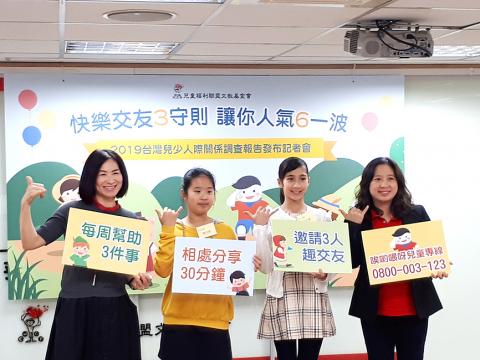A nationwide survey found that 65 percent of children are worried about interpersonal relationships, while more than 10 percent say they are unpopular in the classroom, the Child Welfare League Foundation said yesterday.
Its survey, which asked 11 and 12-year-olds questions about interpersonal relationships, found that respondents on average had 10 good friends and two peers they dislike in class, the foundation said.
A total of 69.7 percent of respondents said they have friends whom they often play with between classes, while 64.1 percent said their friends would comfort them when they are sad, the foundation said.

Photo: CNA
However, 14.5 percent of respondents said more classmates disliked than liked them, while 18.6 percent said that they have a difficult time finding classmates willing to team up with them for group assignments and 10.9 percent said they were often bullied and mocked at school.
While 64.9 percent of the respondents said they worried about issues related to interpersonal relationships, when asked what bothers them the most, 42.4 percent said they were worried about how to reconcile with a friend after an argument, the foundation said.
Another common worry was not knowing how to express their opinions in social situations (41.1 percent), it said.
While 24.3 percent of respondents said they would share concerns with a teacher, 16.4 percent said they would not tell anyone, the survey found.
Asked about qualities they look for in a friend, 89.4 percent of respondents said reciprocity, 69 percent said good emotional management and 65.5 percent said shared hobbies, the foundation said.
Respondents said they enjoyed group projects and activities more if they were regular occurrences, it said.
However, if a teacher makes children who cannot find a group work together, or punishes an entire group for one child’s behavior, the unpopular children would become further isolated and grow to dislike teamwork, the foundation said.
When children have better relationships with classmates, they tend to be happier and more willing to go to school, foundation executive director Pai Li-fang (白麗芳) said.
To help children develop better interpersonal skills, teachers should arrange collaborative activities to teach students about teamwork, while parents can encourage children to be more caring and helpful, she said.
The survey, conducted between Dec. 13 last year and Jan. 8, collected 1,588 valid responses.

Taiwanese can file complaints with the Tourism Administration to report travel agencies if their activities caused termination of a person’s citizenship, Mainland Affairs Council Minister Chiu Chui-cheng (邱垂正) said yesterday, after a podcaster highlighted a case in which a person’s citizenship was canceled for receiving a single-use Chinese passport to enter Russia. The council is aware of incidents in which people who signed up through Chinese travel agencies for tours of Russia were told they could obtain Russian visas and fast-track border clearance, Chiu told reporters on the sidelines of an event in Taipei. However, the travel agencies actually applied

Japanese footwear brand Onitsuka Tiger today issued a public apology and said it has suspended an employee amid allegations that the staff member discriminated against a Vietnamese customer at its Taipei 101 store. Posting on the social media platform Threads yesterday, a user said that an employee at the store said that “those shoes are very expensive” when her friend, who is a migrant worker from Vietnam, asked for assistance. The employee then ignored her until she asked again, to which she replied: "We don't have a size 37." The post had amassed nearly 26,000 likes and 916 comments as of this

New measures aimed at making Taiwan more attractive to foreign professionals came into effect this month, the National Development Council said yesterday. Among the changes, international students at Taiwanese universities would be able to work in Taiwan without a work permit in the two years after they graduate, explainer materials provided by the council said. In addition, foreign nationals who graduated from one of the world’s top 200 universities within the past five years can also apply for a two-year open work permit. Previously, those graduates would have needed to apply for a work permit using point-based criteria or have a Taiwanese company

The Shilin District Prosecutors’ Office yesterday indicted two Taiwanese and issued a wanted notice for Pete Liu (劉作虎), founder of Shenzhen-based smartphone manufacturer OnePlus Technology Co (萬普拉斯科技), for allegedly contravening the Act Governing Relations Between the People of the Taiwan Area and the Mainland Area (臺灣地區與大陸地區人民關係條例) by poaching 70 engineers in Taiwan. Liu allegedly traveled to Taiwan at the end of 2014 and met with a Taiwanese man surnamed Lin (林) to discuss establishing a mobile software research and development (R&D) team in Taiwan, prosecutors said. Without approval from the government, Lin, following Liu’s instructions, recruited more than 70 software